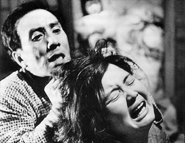Anticipating Nagisa Oshima’s Ceremony in its metaphoric representation of the dying of the samurai class through contaminated bloodlines, mystical connections, incestuous relationships, frailty, and impotence, Intentions of Murder bears the characteristic imprint of Shohei Imamura’s recurring preoccupations: the sensuality and resilience of women, the manifestation of individualism in a codified society, the idiosyncrasies and primitive instinctuality that define human behavior. Opening to an establishing montage of a working class suburb that overlooks commuter railroad tracks, the double entendred image of a train rushing headlong into the foreground is reinforced in the subsequent image of a gaunt salaryman, Riichi Takahashi (Kô Nishimura), his elderly mother Tadae (Ranko Akagi) and his young son, Masaru, restlessly waiting at a train station – as a seemingly random bystander inconspicuously hovers nearby – for the arrival of his earthy, common law wife, Sadako (Masumi Harukawa) who is bringing a change of clothes for his business trip, only to discover that she has misunderstood his instructions and has only brought along a change of underwear. In hindsight, the introductory milieu proves to be a terse encapsulation of the strange dynamics at work in the Takahashi household – a purported “curse” (as alluded to by the servants in the Takahashis’ ancestral home) that had been sown generations earlier by the family patriarch’s abandonment of his mistress, Sadako’s grandmother, following the birth (and appropriation) of their child who, in her profound despair, had taken her own life. Reluctant to register the lower classed Sadako, who once served as the family housemaid, as his legal wife, Riichi’s parents had instead registered Masaru as their own child in an attempt to mask the boy’s illegitimacy and ensure the succession of the Takahashi bloodline, leaving Sadako without a legal claim to her own son (but with all the domestic responsibilities for his upbringing). Returning home alone after Tadae takes custody of Masaru in Riichi’s absence, Sadako is followed by the enigmatic bystander, a poor, washed up musician named Hiraoko (Shigeru Tsuyuguchi) whose nebulous intentions turn from robbing the simple-minded housewife to committing rape, seemingly driven by the mere sight of Sadako’s bound, voluptuous form struggling to break free in the shadows. Consumed by thoughts of suicide as an honorable gesture to escape the moral stain of her violation, Sadako’s morbid preoccupation soon gives way to a return to normalcy, as Masaru and Riichi return home, and Sadako begins to busy herself with repairing items that were broken during the struggle (and consequently, concealing the evidence of the committed crime). However, when Hiraoko unexpectedly returns declaring his undying love for Sadako, her desperation to maintain at all costs her unhappy marriage and menial status within the Takahashi clan propel her to concoct an ill conceived plan to permanently rid herself of her troublesome suitor.
Returning to animal imagery as a surrogate for human behavior that Imamura would incorporate in Pigs and Battleships and The Insect Woman, the recurring images of captive mice and silkworms in Intentions of Murder, nevertheless, prove to be more malleable. Ostensibly a representation of the robust Sadako’s figurative social captivity as an undereducated, peasant woman in a male-dominated society (albeit one of sickly and financially insolvent men), the plight of Masaru’s pet mice – the smaller one having apparently killed and consumed the larger one – may also be seen as a reflection of her overturned role in her relationships with the (Implicitly more powerful) people around her. Similarly, the re-appearance of a lone silkworm in the final sequence that recalls an earlier memory of a silkworm being crushed during an act of punishment illustrates both the realization of a stunted, childhood fixation, as well as Sadako’s dramatic transformation in her return, full circle, to Riichi’s ancestral home. In essence, even as Riichi and Hiraoko alternately use (violent) sexuality as a means of exerting control and domination over Sadako, it becomes an even more powerful weapon in the hands of the exploited heroine – a poetic role reversal that is incisively marked by chance events that would derail her own “intentions of murder”, initially, in her fateful encounter with Hiraoko in a tunnel after their Tokyo-bound train is delayed by a snowstorm, and subsequently, in her indirect implication in a traffic accident that would bring an unexpected end to Riichi’s infidelity. Framed against Sadako’s continued efforts to correct the official family registry that would identify her as Masaru’s biological mother, her struggle becomes a metaphor, not only to find a place within the margins of a patriarchal – and vestigially class-entrenched – society, but also for the validation of her own identity.
© Acquarello 2007. All rights reserved.
